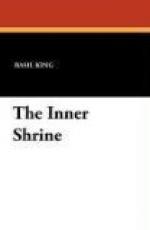“Yes, Mademoiselle? You would only blame me—?”
“I should only blame you if—now that you know the truth—you didn’t correct the impression you have given.”
“Are you going to begin on that again?” he asked, in a tone of disappointment.
“I’m not beginning again, because I’ve never ceased. If I say anything new on the subject, it is this—that it’s time the final word was spoken.”
“I agree with you there; it is time for that word; but you must speak it.”
There was a ring of energy in his voice which caused her to turn from her contemplation of the fire and look at him. When she did he had taken on a new air of resolution.
“I think it’s time we came to a definite understanding,” he went on, “and that you should see how the matter looks from my point of view. You speak of doing right, Mademoiselle, as if it were an easy thing. You don’t realize that, for me, it would have to be the last act but one in life.”
In spite of the shock, she ignored his implied confession, going on to speak in the tone of ordinary conversation.
“The last act but one? I don’t understand you.”
“Really? I’m surprised at that. You’re so good a sportsman that I should think you’d see that if I do what you ask there will be only one more thing left for me.”
For a few minutes she looked at him silently, with fixed gaze, taking in the full measure of his meaning.
“That’s folly,” she said at last.
“Is it? Not for me. It might be for some people, but—not for me. You must remember who I am. I’m a Frenchman. I’m an aristocrat. I’m a Bienville. I’m a member of a class, of a clan, that lives and breathes on—honor. I can do without almost everything in the world but that. I can do without money, I can do without morals, I can do without most kinds of common honesty, I can do without nearly all the Christian virtues, and still keep my place among my friends; but I can’t do without that particular shade of conduct which they and I understand by the word honor.”
“But aren’t you doing without it as it is?”
“No; because there again our code is special to ourselves. With us the crime is not in suspicion or supposition; it isn’t even in detection. It’s in admission. It’s in confession. All sorts of things may be thought of you, and said of you, and even known of you, and you can bluff them out; but when you have acknowledged them—you’re doomed.”
“Even so, isn’t it better to acknowledge them—and be doomed?”
“That’s the question. That’s what I have to decide. That’s where you must help me decide. If you had allowed me, I should have made up my own mind, on my own responsibility; but you won’t let me. Now that the incident at Lakefield is no good as evidence, I see that you will never rest until we come to the plainest of plain speech. The problem I’ve had to solve is this: Is Diane Eveleth to be happy, or am I? Is she to rise while I go under, or shall I keep her down and stay on the surface? Since it’s her life or mine, which is it to be? The alternative may be a brutal one, but there it is.”




